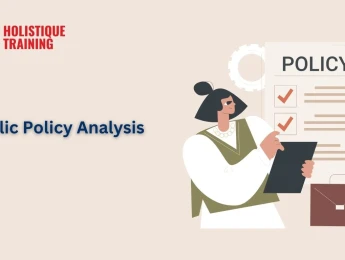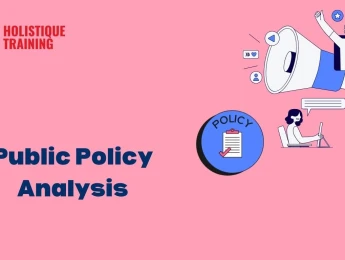Analysing public policies and public-sector decision-making is imperative to providing a comprehensive understanding of their impact and effectiveness on society. Through careful examination, we can assess whether policy objectives are being met, identify unintended consequences, and ensure that resources are allocated efficiently.
Policy analysis helps evaluate the fairness and equity of decisions, contributing to the overall accountability of public institutions. By scrutinising the decision-making processes, we gain insights into the factors influencing choices, thereby promoting transparency and accountability.
It also helps evaluate the fairness and equity of decisions, contributing to the overall accountability of public institutions. By assessing the decision-making processes, we gain insights into the factors influencing government and public body choices, thereby promoting transparency and accountability for society as a whole.
Upon completion of this course, participants will be able to:
- Enhance proficiency in formulating and implementing public policies, generating viable solutions applicable to public policy initiatives and internal corporate settings.
- Construct analytical frameworks that foster critical thinking in public policy development.
- Acquire a solid understanding of quantitative tools and research methodologies essential for conducting evidence-based impact evaluations and honing practical communication skills specific to public policy.
This course is designed for anyone responsible for managing public policy changes or creating a public policy analysis to enable future change. It would be most beneficial for:
- Government Officials
- Project Managers
- Change & Control Managers
- Risk Assessors
- PR Professionals
- Auditors
- Partnerships Managers
- Data Analysts
This course uses a variety of adult learning styles to aid full understanding and comprehension. Participants will review various case studies to understand the impacts of public policy change.
They will review real-world data to assess the current need for change and participate in role-playing activities related to negotiating and handling negative public opinion.
Day 5 of each course is reserved for a Q&A session, which may occur off-site. For 10-day courses, this also applies to day 10
Section 1: The Goals of Public Policy Creation
- Understanding the role of government in setting policy objectives.
- Analysing the impact of public policies on society.
- Identifying key stakeholders in policy goal setting.
- Case studies: successful public policy goals and their outcomes.
- Challenges in crafting effective public policy goals.
- The role of public opinion in shaping policy objectives.
- International perspectives on public policy goals.
- Evaluating and measuring the success of policy goals.
- Ethical considerations in public policy creation.
Section 2: Public Policy Wider Strategy for Sustainable Development
- Future trends and innovations in setting public policy goals.
- Social inclusion and equity in sustainable development strategies.
- Economic policies for long-term sustainability.
- Climate change mitigation and adaptation strategies.
- Public-private partnerships in sustainable development.
- Evaluating the impact of public policies on sustainable development.
- Role of technology in achieving sustainable development goals.
- International cooperation and global partnerships for sustainability.
- Governance and policy implementation for sustainable development.
Section 3: Public Interaction & Community Building
- Building trust and transparency in government interactions.
- Social media and its role in fostering community engagement.
- Public consultation methods and best practices.
- Addressing diverse community needs in government initiatives.
- Crisis communication and managing public perception.
- The role of civic education in community building.
Section 4: The Role of Institutions in Public Policy
- Historical evolution and development of public institutions.
- Institutional frameworks for effective policy formulation and implementation.
- The role of legal and regulatory institutions in shaping policies.
- Analysing the impact of political institutions on public policy outcomes.
- Institutional capacity building and organisational effectiveness.
Section 5: Public Sector Evaluation Methods
- Quantitative and qualitative evaluation methods in the public sector.
- Performance measurement and key performance indicators (KPIs).
- Cost-benefit analysis for assessing public sector projects.
- Outcome and impact evaluation techniques in public programs.
- Evaluating efficiency, effectiveness, and equity in public services.
Section 6: Accountability & Public Policy Representation
- Mechanisms for ensuring accountability in government decision-making.
- Role of elected officials and representatives in policy accountability.
- Public scrutiny and transparency in the policy-making process.
- Accountability in budgeting and financial management of public funds.
- Evaluating the effectiveness of accountability mechanisms in practice.
- Public policy representation and the concept of responsive governance.
Section 7: Government Challenges with Policy Change
- Identifying barriers to policy change in government.
- Understanding resistance to policy innovation and reform.
- Political and bureaucratic challenges in policy implementation.
- Public perception and communication challenges during policy change.
- Balancing short-term political considerations with long-term policy goals.
Upon successful completion of this training course, delegates will be awarded a Holistique Training Certificate of Completion. For those who attend and complete the online training course, a Holistique Training e-Certificate will be provided.
Holistique Training Certificates are accredited by the British Assessment Council (BAC) and The CPD Certification Service (CPD), and are certified under ISO 9001, ISO 21001, and ISO 29993 standards.
CPD credits for this course are granted by our Certificates and will be reflected on the Holistique Training Certificate of Completion. In accordance with the standards of The CPD Certification Service, one CPD credit is awarded per hour of course attendance. A maximum of 50 CPD credits can be claimed for any single course we currently offer.
- Course Code PM2-119
- Course Format Classroom, Online,
- Duration 5 days














